实验3:OpenFlow协议分析实践
一、实验目的
1.能够运用 wireshark 对 OpenFlow 协议数据交互过程进行抓包;
2.能够借助包解析工具,分析与解释 OpenFlow协议的数据包交互过程与机制。
二、实验环境
1.下载虚拟机软件Oracle VisualBox;
2.在虚拟机中安装Ubuntu 20.04 Desktop amd64,并完整安装Mininet;
三、实验要求
(一)基本要求
1.搭建下图所示拓扑,完成相关 IP 配置,并实现主机与主机之间的 IP 通信。用抓包软件获取控制器与交换机之间的通信数据包。
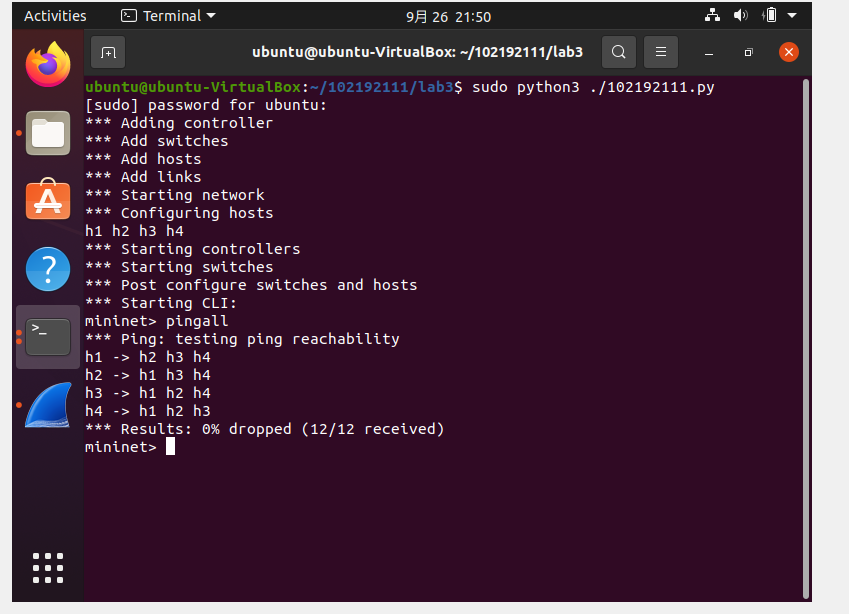
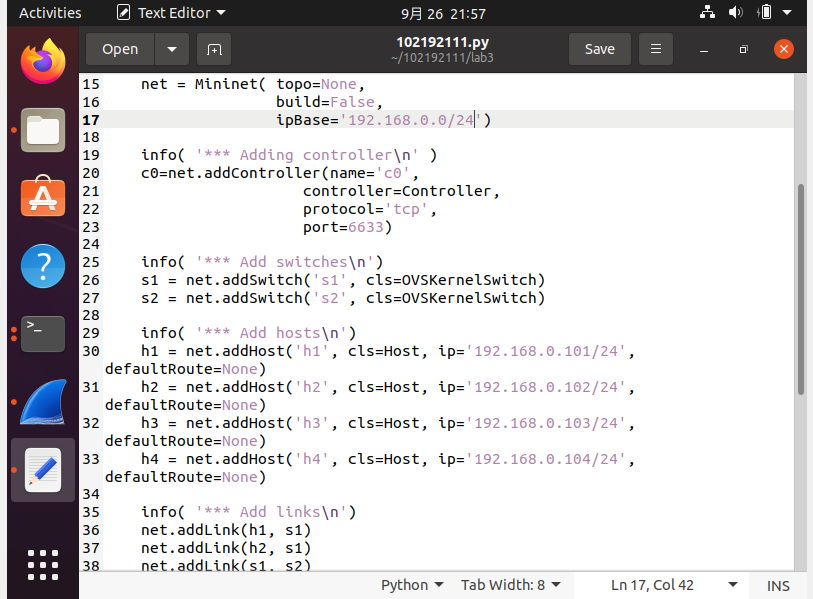
2.查看抓包结果,分析OpenFlow协议中交换机与控制器的消息交互过程,画出相关交互图或流程图。
- HELLO:
控制器与交换机互相发送HELLO消息,可以看到控制器OpenFlow版本为1.0,交换机OpenFlow版本为1.5,依据向下兼容,使用OpenFlow1.0。
(1)控制器6633端口->交换机55844端口:
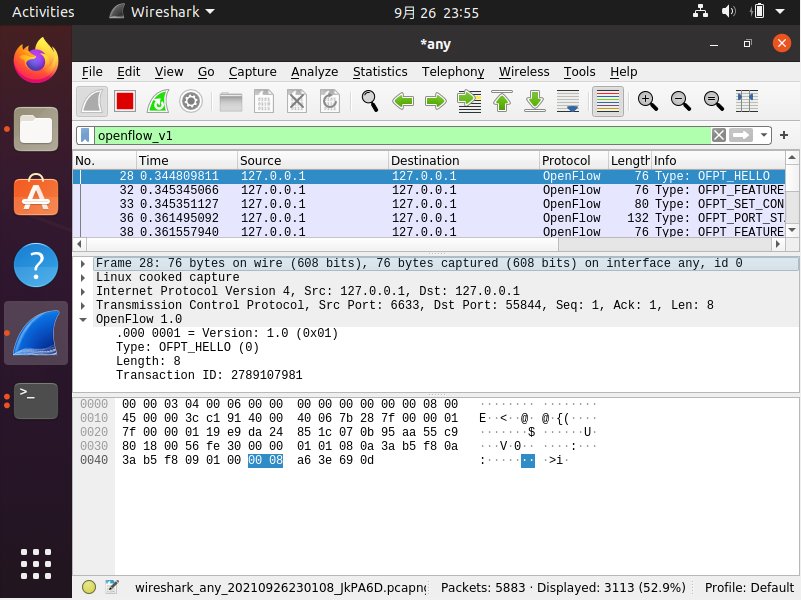
(2)交换机55844端口->控制器6633端口:
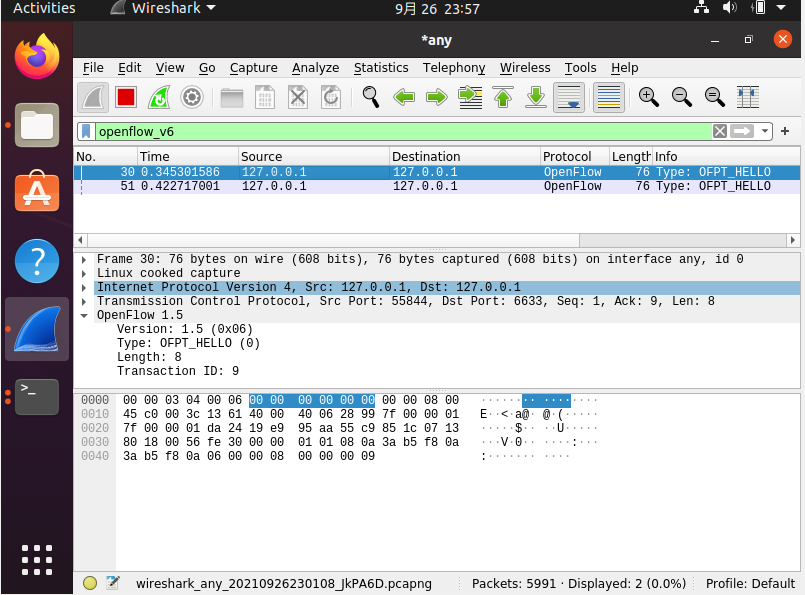
- FEATURES_REQUEST/SET_CONFIG:
(1)控制器6633端口(我需要你的特征信息)->交换机55844端口:
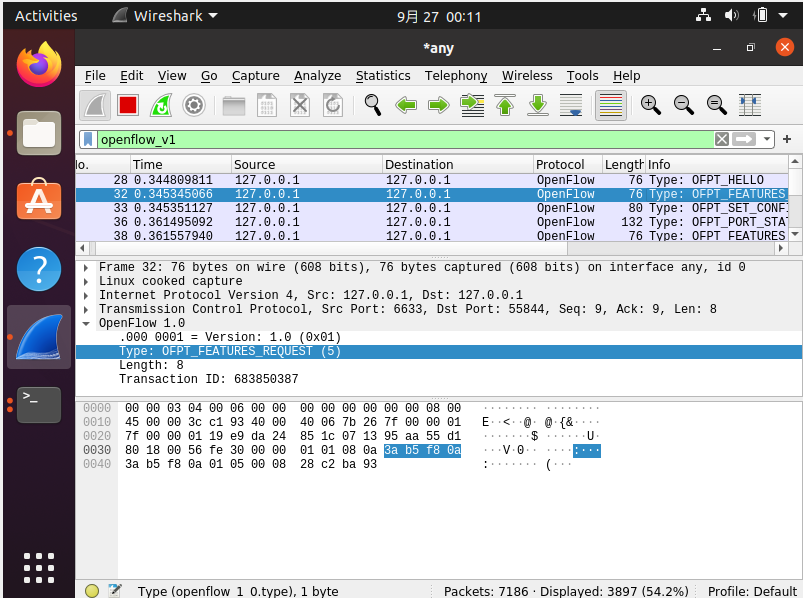
(2)控制器6633端口(请按照我给你的config flag和max bytes of packet进行配置)->交换机55844端口:
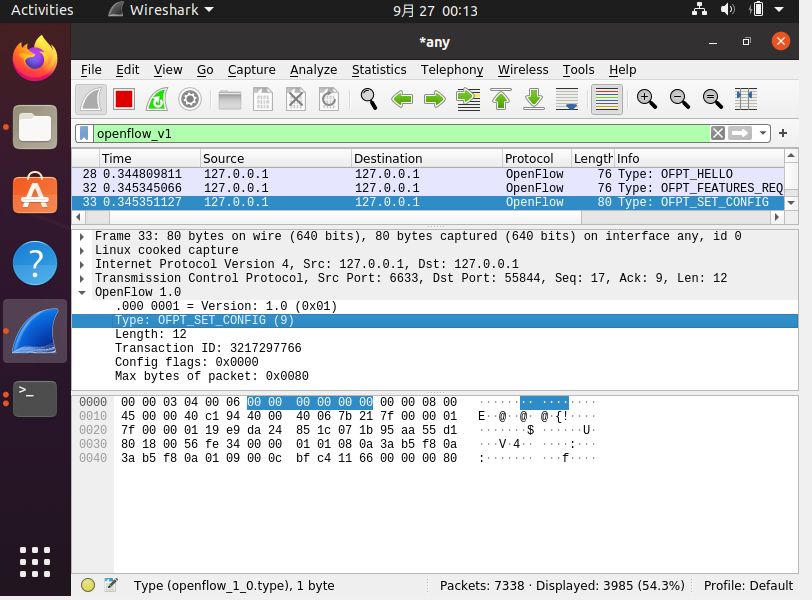
-
PORT_STATUS:
当交换机端口发生变化时,告知控制器相应的端口状态:
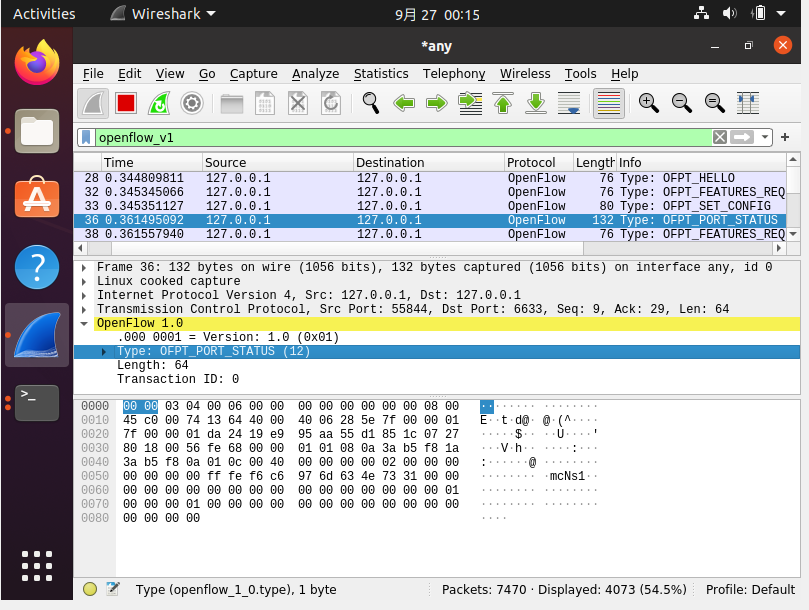
-
FEATURES_REPLY:
交换机55844端口(这是我的特征信息,请查收)->控制器6633端口:
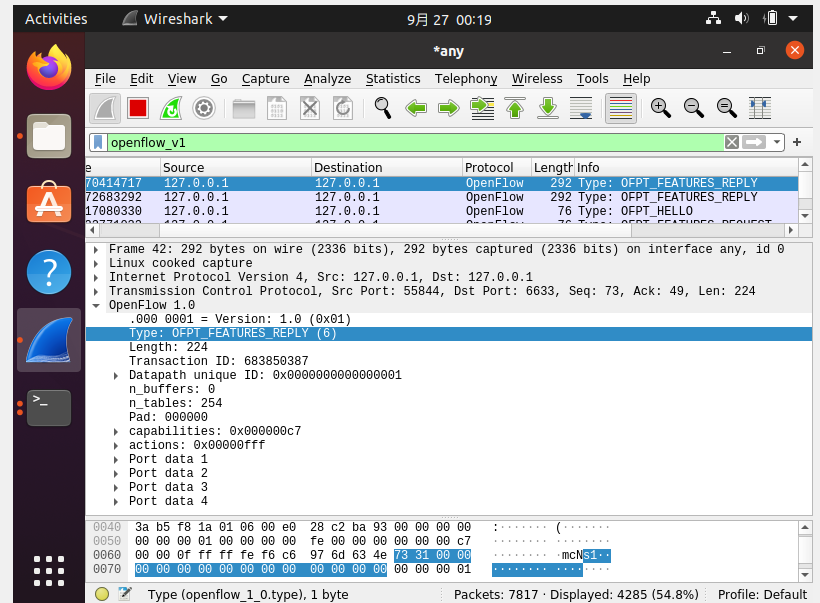
-
PACKET_IN:
(1)有两种情况:
交换机查找流表,发现没有匹配条目时
有匹配条目但是对应的action是OUTPUT=CONTROLLER时
(2)交换机55846(查找的是后面的,所以交换机端口与前面的55844端口略有差异)端口(有数据包进来,请指示)-> 控制器6633端口
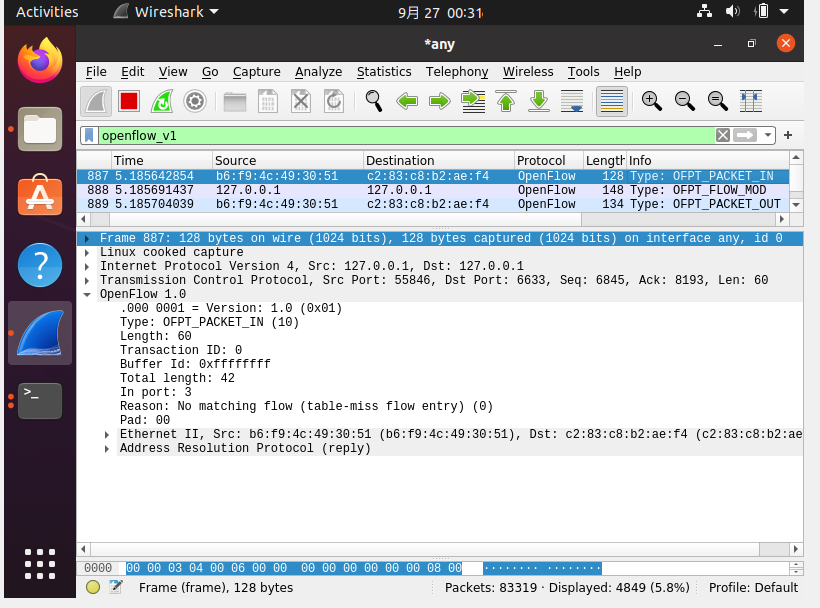
分析抓取的数据包,可以看到交换机没有发现自己要匹配的流表:Reason:
No matching flow (table-miss flow entry) (0),所以要询问控制器如何处理。
-
FLOW_MOD:
分析抓取的flow_mod数据包,控制器通过6633端口向交换机55846端口下发流表项,指导数据的转发处理
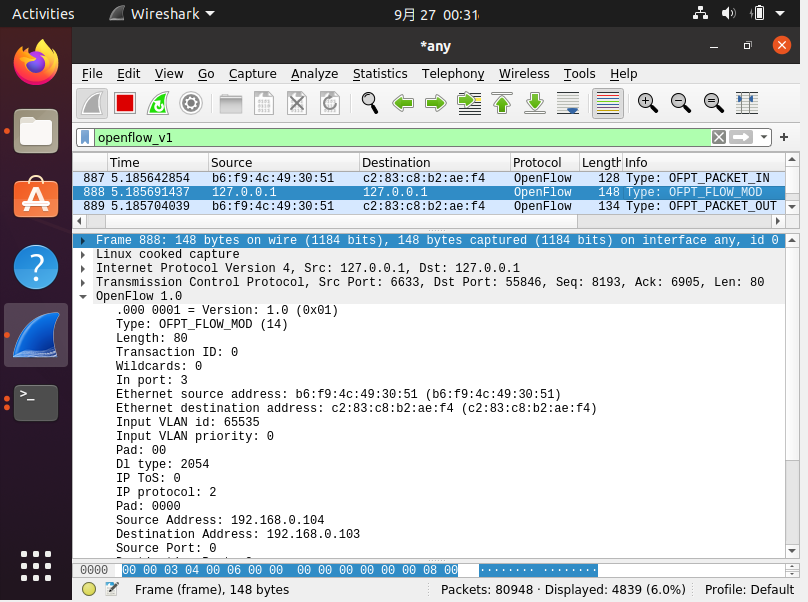
-
PACKET_OUT:
控制器6633端口(请按照我给你的action进行处理)-> 交换机55846端口:输出到交换机的0端口(选择截取的内容有点问题,没有显示端口号)
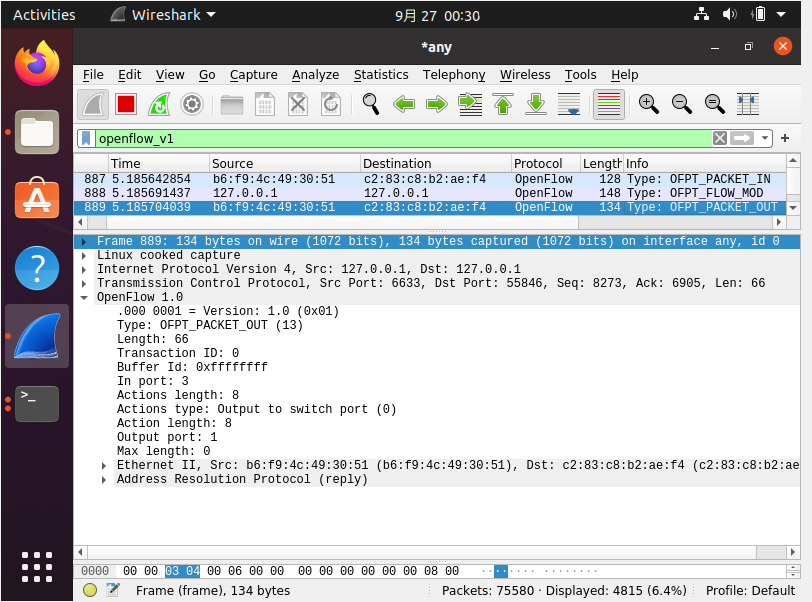
-
综上可知,流程图为:
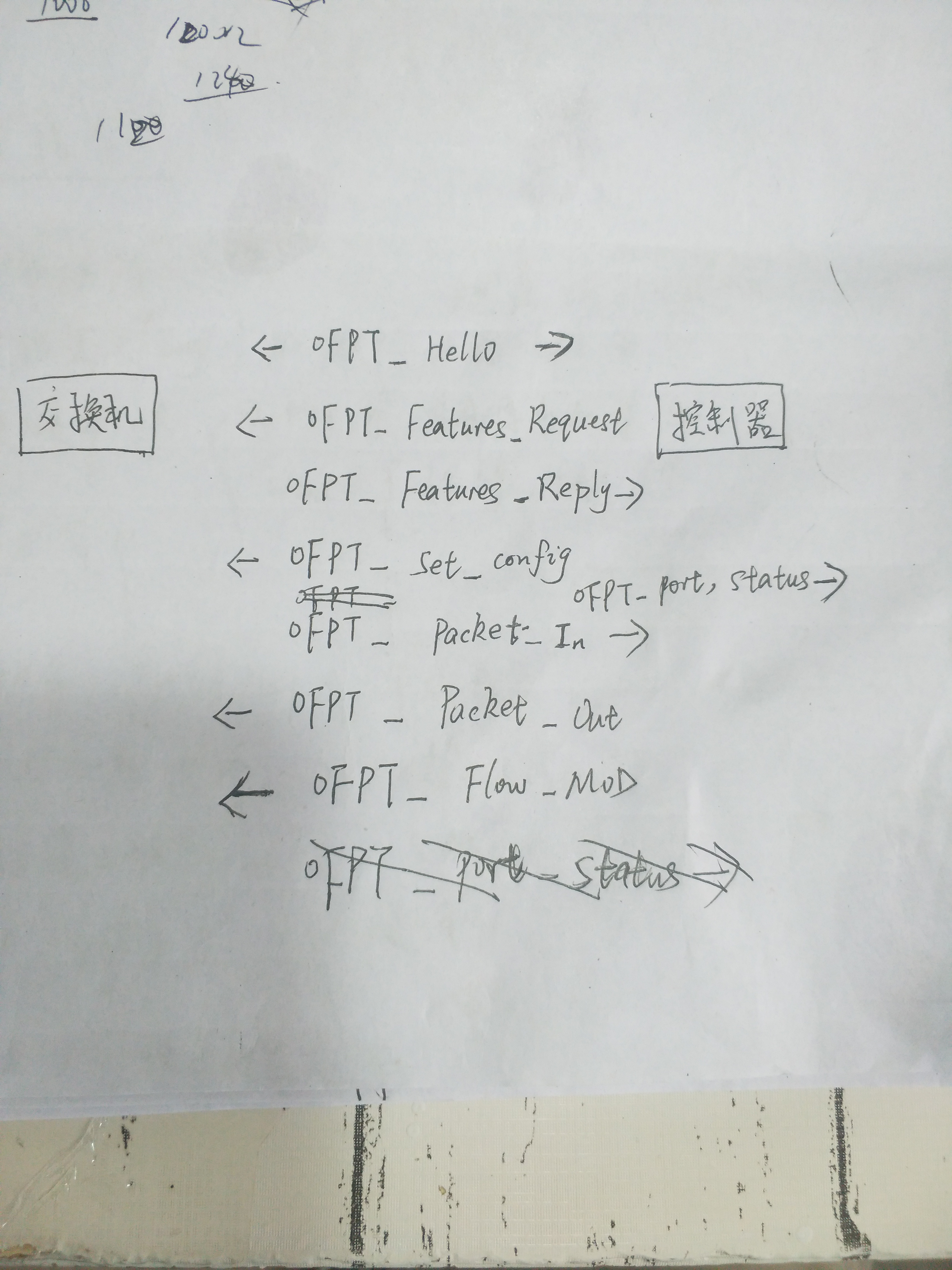
3.回答问题:交换机与控制器建立通信时是使用TCP协议还是UDP协议?
对wireshark的抓包进行分析,可以看出交换器与控制器建立通信时使用的是TCP协议(Transmission Control Protocol)。
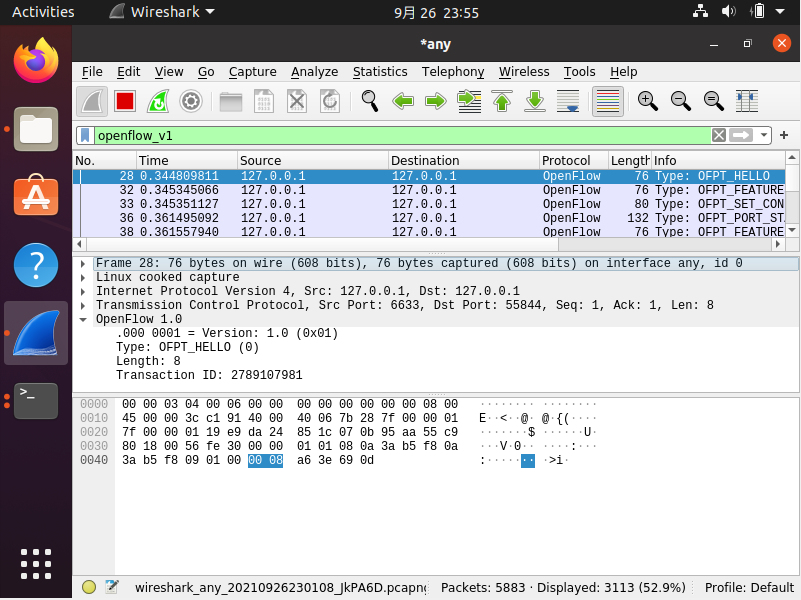
(二)进阶要求
1.将抓包结果对照OpenFlow源码,了解OpenFlow主要消息类型对应的数据结构定义。
- HELLO:
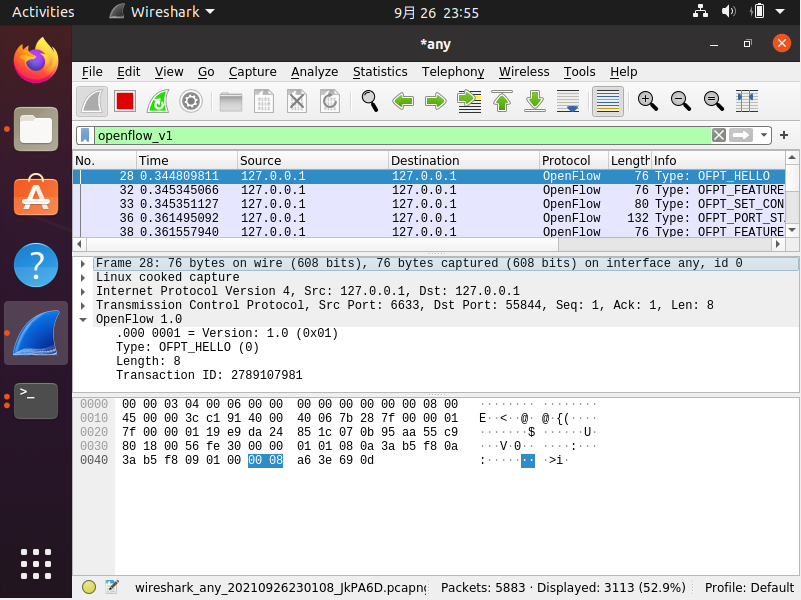
OpenFlow源码:
struct ofp_header {
uint8_t version; /* OFP_VERSION. */
uint8_t type; /* One of the OFPT_ constants. */
uint16_t length; /* Length including this ofp_header. */
uint32_t xid; /* Transaction id associated with this packet.
Replies use the same id as was in the request
to facilitate pairing. */
};
struct ofp_hello {
struct ofp_header header;
};
可以看到对应了HELLO报文的四个参数
-
EATURES_REQUEST:
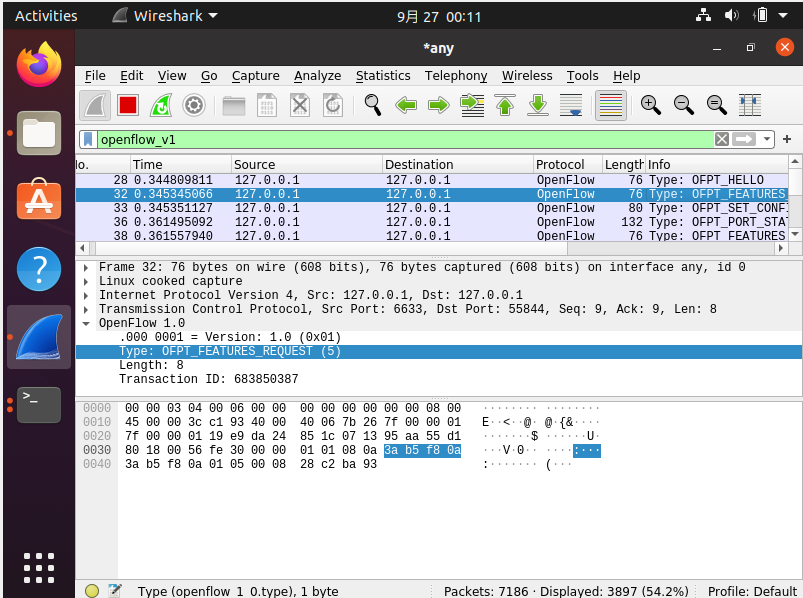
可以看到格式与上述ofp_header结构体中数据相同 -
SET_CONFIG:
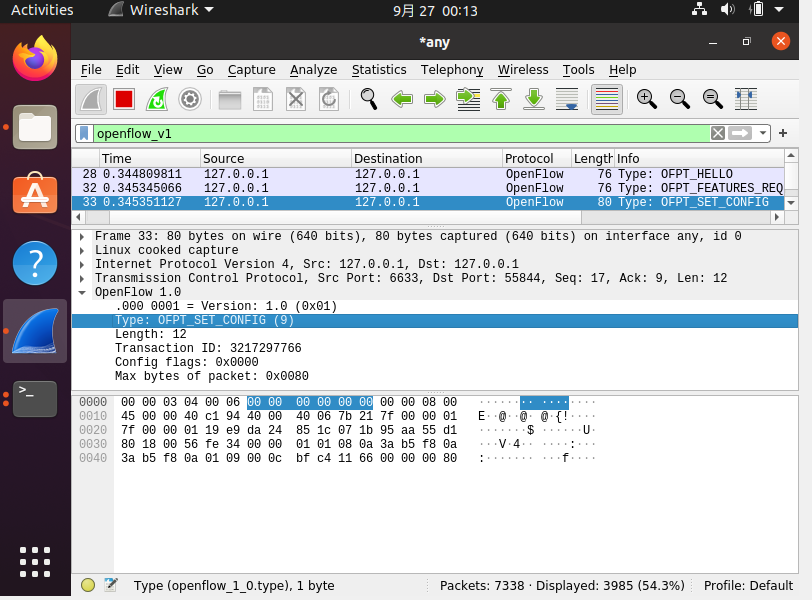
OpenFlow源码:
struct ofp_switch_config {
struct ofp_header header;
uint16_t flags; /* OFPC_* flags. */
uint16_t miss_send_len; /* Max bytes of new flow that datapath should
send to the controller. */
};
- PORT_STATUS:
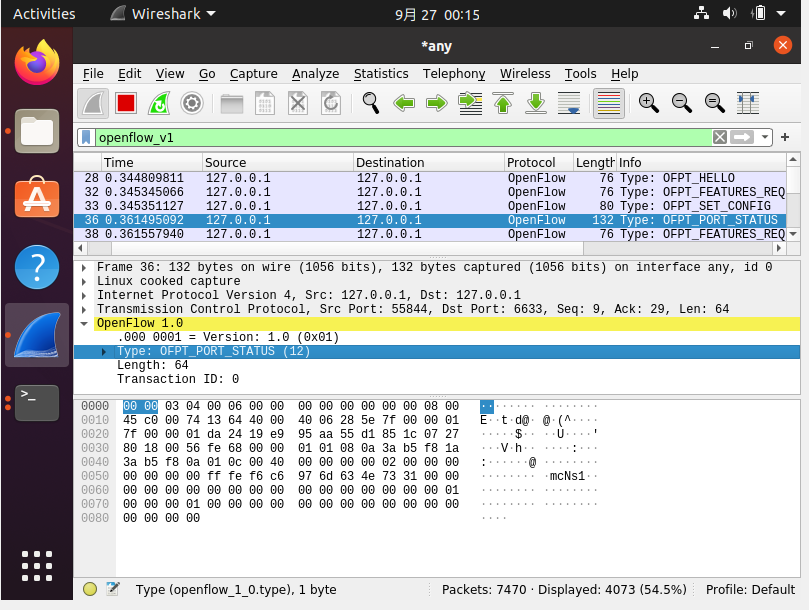
OpenFlow源码:
struct ofp_port_status {
struct ofp_header header;
uint8_t reason; /* One of OFPPR_*. */
uint8_t pad[7]; /* Align to 64-bits. */
struct ofp_phy_port desc;
};
- FEATURES_REPLY:
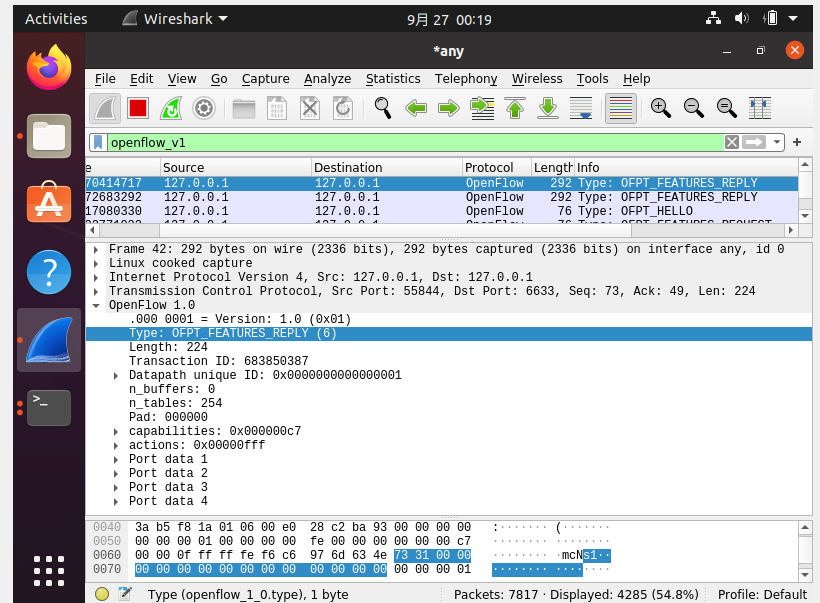
OpenFlow源码:
struct ofp_phy_port {
uint16_t port_no;
uint8_t hw_addr[OFP_ETH_ALEN];
char name[OFP_MAX_PORT_NAME_LEN]; /* Null-terminated */
uint32_t config; /* Bitmap of OFPPC_* flags. */
uint32_t state; /* Bitmap of OFPPS_* flags. */
/* Bitmaps of OFPPF_* that describe features. All bits zeroed if
* unsupported or unavailable. */
uint32_t curr; /* Current features. */
uint32_t advertised; /* Features being advertised by the port. */
uint32_t supported; /* Features supported by the port. */
uint32_t peer; /* Features advertised by peer. */
};
struct ofp_switch_features {
struct ofp_header header;
uint64_t datapath_id; /* Datapath unique ID. The lower 48-bits are for
a MAC address, while the upper 16-bits are
implementer-defined. */
uint32_t n_buffers; /* Max packets buffered at once. */
uint8_t n_tables; /* Number of tables supported by datapath. */
uint8_t pad[3]; /* Align to 64-bits. */
/* Features. */
uint32_t capabilities; /* Bitmap of support "ofp_capabilities". */
uint32_t actions; /* Bitmap of supported "ofp_action_type"s. */
/* Port info.*/
struct ofp_phy_port ports[0]; /* Port definitions. The number of ports
is inferred from the length field in
the header. */
};
- PACKET_IN:
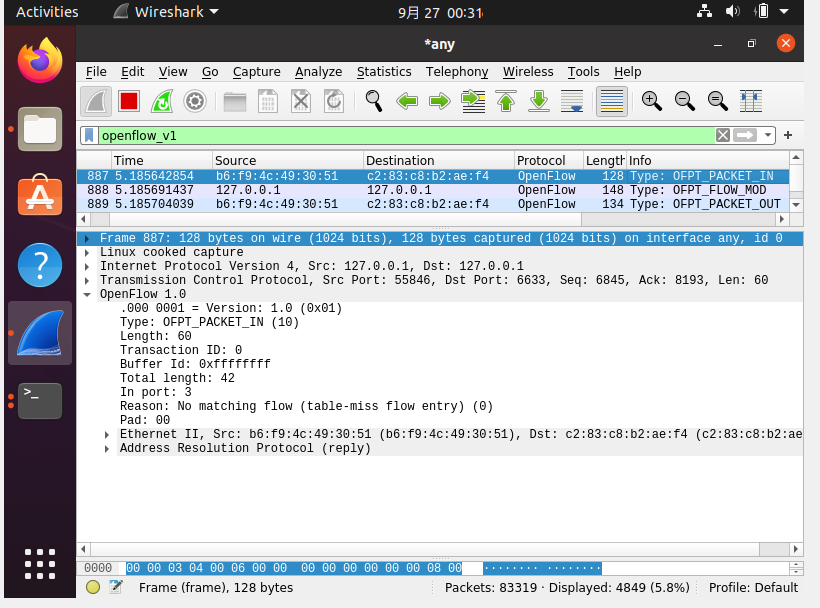
OpenFlow源码:
/没有匹配/
enum ofp_packet_in_reason {
OFPR_NO_MATCH, /* No matching flow. */
OFPR_ACTION /* Action explicitly output to controller. */
};
/控制器发送包/
struct ofp_packet_in {
struct ofp_header header;
uint32_t buffer_id; /* ID assigned by datapath. */
uint16_t total_len; /* Full length of frame. */
uint16_t in_port; /* Port on which frame was received. */
uint8_t reason; /* Reason packet is being sent (one of OFPR_*) */
uint8_t pad;
uint8_t data[0]; /* Ethernet frame, halfway through 32-bit word,
so the IP header is 32-bit aligned. The
amount of data is inferred from the length
field in the header. Because of padding,
offsetof(struct ofp_packet_in, data) ==
sizeof(struct ofp_packet_in) - 2. */
};
- FLOW_MOD:
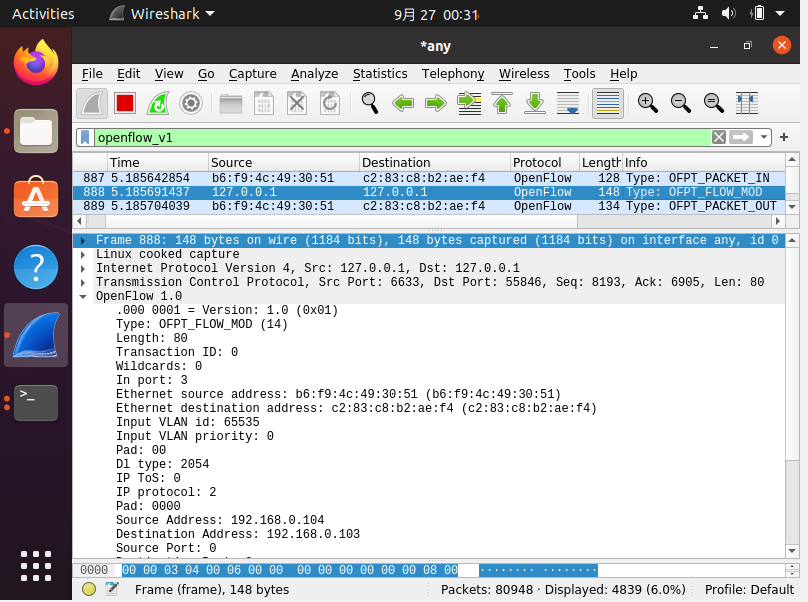
OpenFlow源码:
struct ofp_flow_mod {
struct ofp_header header;
struct ofp_match match; /* Fields to match */
uint64_t cookie; /* Opaque controller-issued identifier. */
/* Flow actions. */
uint16_t command; /* One of OFPFC_*. */
uint16_t idle_timeout; /* Idle time before discarding (seconds). */
uint16_t hard_timeout; /* Max time before discarding (seconds). */
uint16_t priority; /* Priority level of flow entry. */
uint32_t buffer_id; /* Buffered packet to apply to (or -1).
Not meaningful for OFPFC_DELETE*. */
uint16_t out_port; /* For OFPFC_DELETE* commands, require
matching entries to include this as an
output port. A value of OFPP_NONE
indicates no restriction. */
uint16_t flags; /* One of OFPFF_*. */
struct ofp_action_header actions[0]; /* The action length is inferred
from the length field in the
header. */
};
struct ofp_action_header {
uint16_t type; /* One of OFPAT_*. */
uint16_t len; /* Length of action, including this
header. This is the length of action,
including any padding to make it
64-bit aligned. */
uint8_t pad[4];
};
struct ofp_match {
uint32_t wildcards; /* Wildcard fields. */
uint16_t in_port; /* Input switch port. */
uint8_t dl_src[OFP_ETH_ALEN]; /* Ethernet source address. */
uint8_t dl_dst[OFP_ETH_ALEN]; /* Ethernet destination address. */
uint16_t dl_vlan; /* Input VLAN id. */
uint8_t dl_vlan_pcp; /* Input VLAN priority. */
uint8_t pad1[1]; /* Align to 64-bits */
uint16_t dl_type; /* Ethernet frame type. */
uint8_t nw_tos; /* IP ToS (actually DSCP field, 6 bits). */
uint8_t nw_proto; /* IP protocol or lower 8 bits of
* ARP opcode. */
uint8_t pad2[2]; /* Align to 64-bits */
uint32_t nw_src; /* IP source address. */
uint32_t nw_dst; /* IP destination address. */
uint16_t tp_src; /* TCP/UDP source port. */
uint16_t tp_dst; /* TCP/UDP destination port. */
};
- PACKET_OUT:
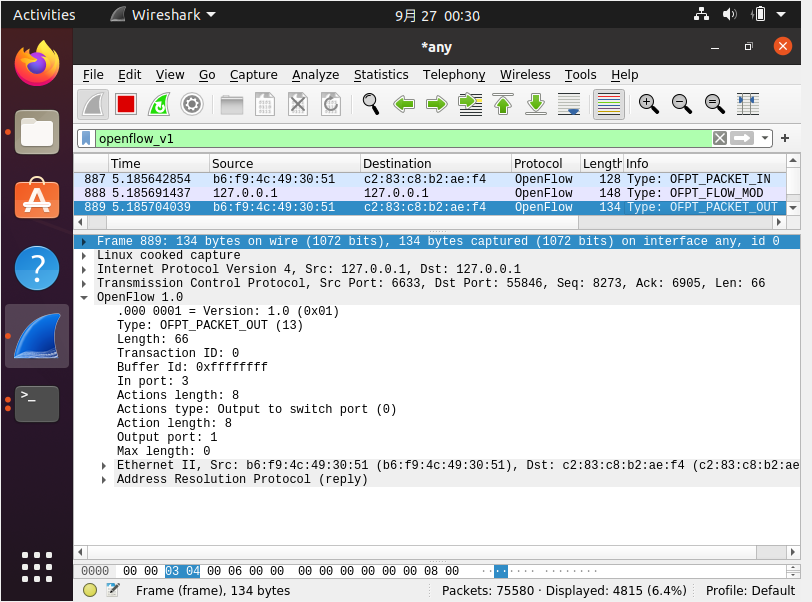
OpenFlow源码:
struct ofp_action_header {
uint16_t type; /* One of OFPAT_*. */
uint16_t len; /* Length of action, including this
header. This is the length of action,
including any padding to make it
64-bit aligned. */
uint8_t pad[4];
};
struct ofp_packet_out {
struct ofp_header header;
uint32_t buffer_id; /* ID assigned by datapath (-1 if none). */
uint16_t in_port; /* Packet's input port (OFPP_NONE if none). */
uint16_t actions_len; /* Size of action array in bytes. */
struct ofp_action_header actions[0]; /* Actions. */
/* uint8_t data[0]; */ /* Packet data. The length is inferred
from the length field in the header.
(Only meaningful if buffer_id == -1.) */
};
四、个人总结
-
实验难度:较简单
-
遇到困难及解决办法:
1、一开始对于先开启抓包再构建拓扑这句话不是很能理解,先开启抓包是要开启到什么程度呢?是要抓包以后再构建拓扑,还是打开拓扑呢?所以便一 一尝试。首先是先构建完拓扑,打开以后再抓包,自然是不行的,找不到hallo,然后是开启抓包再运行拓扑,所幸上次实验已经了解了需要先pinggall,但是还是不行,最后抓包点完any以后再打开之前的拓扑就可以了。
2、源码太多了,看着别人的源码再一一对照,倒也是找到了,在想有没有一种更快的方法可以进行源码的查找。
3、后面步骤有一些图片截图的不太好,过两天想重新截取一下,发现重新抓包以后,交换机的端口发生了变化,所以也就直接用之前截取的图片了。 -
个人感想:
总的来说,这次实验还是比较简单的,对照老师的PPT找就完事了,不是很费事,就是截图得截取好多,但也还行。自己在代码这块还是得抓紧学习,毕竟没什么基础,争取早日能勉强看懂。


